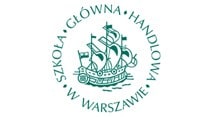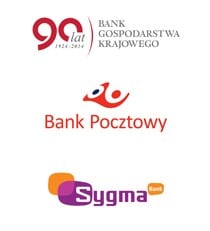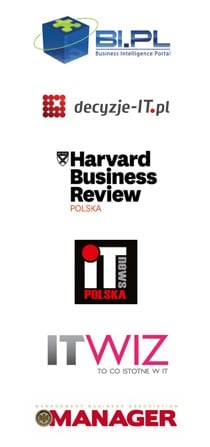| 8:00 – 9:00 | Conference Registration |
| 9:00 – 9:10 |  Welcome Address Speech: Welcome Address Speech:Prof. Janina Jóźwiak Prof. Joanna Plebaniak Prof. Marek Rocki |
| 9:10 – 10:00 |  Opening Lecture: Opening Lecture:Data Analysis in Finance – review of approaches and tendencies Prof. Krzysztof Jajuga This talk will provide a systematic review of data analytical approaches in financial theory and practice, as well as an evaluation of these approaches according to the following taxonomy criteria:
In addition, emphasis will be put on two "newly emerged" types of data and their occurrence in financial practice:
Suitability of classical and new approaches in analyzing these types of data will be discussed. |
| 10:00 – 10:30 |  Presentation: Presentation:How to be a Data Scientist Using SAS® Chuck Kincaid The role of the Data Scientist is the viral job description of the decade. And like LOLcats, there are many types of Data Scientists. What is this new role? Who is hiring them? What do they do? What skills are required to do their job? What does this mean for the SAS programmer and the statistician? Are they obsolete? And finally, if I am a SAS user, how can I become a Data Scientist? Come learn about this "job of the future" and what you can do to be part of it. |
| 10:30 – 11:00 |  Presentation: Presentation:Data everywhere... Dr Iga Sikorska The key to succeeding in business is understanding your customers' needs better than anyone else. The same applies to successful educational institutions. Companies and students expect graduate schools to train future leaders capable of extracting value form vast quantities of data. The goal of modern, leading-edge educational programs is to provide students with the knowledge and skills needed to apply complex methods and tools for large-scale data modeling. |
| 11:00 – 11:30 | Break |
| 11:30 – 12.20 |  Keynote Presentation: Keynote Presentation:Part 1 Title: Applications of Text Analytics and Sentiment Mining Prof. Goutam Chakraborty The proliferation of textual data in business is overwhelming. Unstructured textual data are being constantly generated via call center logs, emails, documents on web, blogs, tweets, customer comments, customer reviews and so on. While the amount of textual data are increasing rapidly, businesses' ability to summarize, understand and make sense of such data for making better business decisions remain challenging. This presentation takes a quick look at how to organize, analyze textual data for extracting insightful customer intelligence from large collection of documents and using such information for improving business operations and performance. Multiple business applications of case studies using real data demonstrating applications of text analytics and sentiment mining using SAS® Text Miner and SAS® Sentiment Analysis Studio will be presented. Part 2 Title: Setting up an Academic Program in Data Mining and Analytics Many universities around the world are either starting or already started to provide courses, certificates and degrees related to topics such as data mining, analytics, data science and so on. This part of the talk will address the typical challenges faced by academicians in starting up such programs. The history, architecture and evolution of the highly successful "certificate programs in data mining and analytics" at Oklahoma State University will also be described in details. |
| 12:20 – 13:00 |  Presentation: Presentation:What drives the need for Data Science? Dr Carsten Bange Advanced Analytics and Data Science are in high demand, but what fuels this demand and why is it important for companies (and interesting for students) to invest in these capabilities? The presentation identifies some major drivers for business and technology advancements that lead not only to massive data production but the increasing need to analyse this data for competitive advantage. The expectations on Data Scientist in this regard are high – possibly too high for a single person to have all necessary skills from business understanding to statistics and programming. This leads to the creation of Data Science teams that cannot only build great models but also care about supporting the business in integrating and operationalizing analysis into business processes. |
| 13:00 – 13:45 | Lunch |
| 13:45 – 14:15 |  Presentation: Presentation:Joint modeling for longitudinal measures and time-to-event-data: application to genetic study Prof. Andrzej Gałecki Longitudinal studies typically involve repeated measures of multiple outcomes measured on different, possibly censored, scales. Many classical statistical methods for data arising from these studies, such as linear and nonlinear mixed effects models or time-to-event analysis, are often focused on a single outcome. Multi-process or joint modeling is an approach which refers to the capability of jointly fitting models to more than one dependent variable, measured over time or for clustered data. In general, this type of model is expressed in terms of sub-models defined for each outcome separately and association sub-models, which tie outcome specific sub-models into one overall model for all outcomes. This presentation will acquaint the audience with thet basic specification of such models and computational aspects. Joint modeling approaches will be illustrated with real data from an international study designed to find genetic determinants of renal function decline measured in terms of glomerular filtration rate and time to end-stage renal disease in patients with Type 1 diabetes. |
| 14:15 – 14:45 |  Presentation: Presentation:OCEAN — addressing the challenges of data-intensive research Prof. Marek Niezgódka Contemporary science undergoes a paradigm shift towards data-intensive scientific discovery. Unprecedented availability of data, new algorithms and methods of data analysis, as well as growing processing power have created new opportunities, but also new challenges. New approaches to big data analytics are required, as are new sets of skills and competencies. ICM has recently launched OCEAN, a research data centre with world-class infrastructure (hardware, software) and interdisciplinary teams of highly-skilled data scientists. OCEAN will be capable of addressing the most demanding challenges in modern science, going beyond state-of-the-art in Earth sciences, medicine, health, transport, logistics, public safety, social sciences and many other areas. ICM's mission extends beyond pure and applied research, as the centre collaborates with a range of entities from public and private sectors. |
| 14:45 – 15:00 |  The Panel's Introductory Lecture: The Panel's Introductory Lecture:Models of cooperation between science and business based on exemplary projects of the Interdisciplinary Centre for Mathematical and Computational Modelling, University of Warsaw Dr Łukasz Bolikowski As we evolve into knowledge-based economy, academia and industry become increasingly interdependent. Thanks to their symbiotic relationship, industry taps into scarce talent pools (e.g. data scientists), while academia gets alternate funding streams and profits from implementing research results in real-world scenarios. European policy-makers — national governments and the European Commission — are well-aware of the benefits of industry-academia co-operation and are creating incentives for technology and knowledge transfer. In this introduction, I will briefly present several case studies of successful co-operations between the Interdisciplinary Centre for Mathematical and Computational Modelling (ICM) and our business partners. The panel will then discuss various aspects of industry-academia partnerships, including, but not limited to: diverse funding models, intellectual property (co-)ownership, privacy issues (e.g. handling of sensitive data), common misconceptions, and incentives for co-operation. |
| 15:00 – 15:45 |  Panel Discussion: Panel Discussion:Models of cooperation between science and business Prof. Włodzisław Duch Prof. Krzysztof Jajuga Prof. Joanna Plebaniak Prof. Marek Rocki, Dr Iga Sikorska Adam P. Świrski |
| 15:45 – 16:00 |  Closing Remarks: Closing Remarks:Prof. Ewa Frątczak |
| 16:00 | Networking Coffee |
Honorary Patronage

Conference Host

Date
14 October 2014
9.00 – 16.00
Conference Venue
Warsaw School of Economics
Building C
128 Niepodległości Ave.
Warsaw 02-554
Partner

Sponsors

Media Partners
